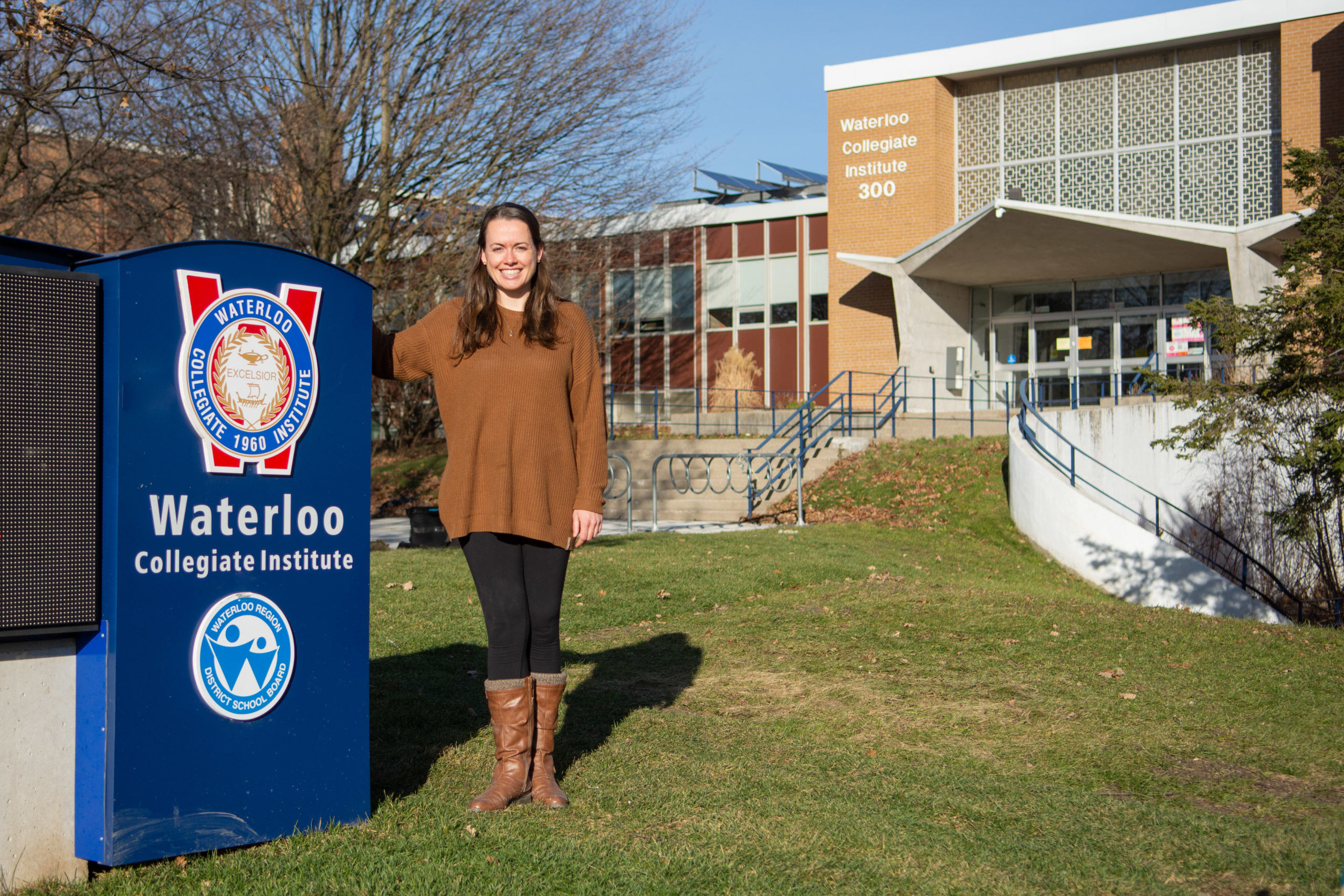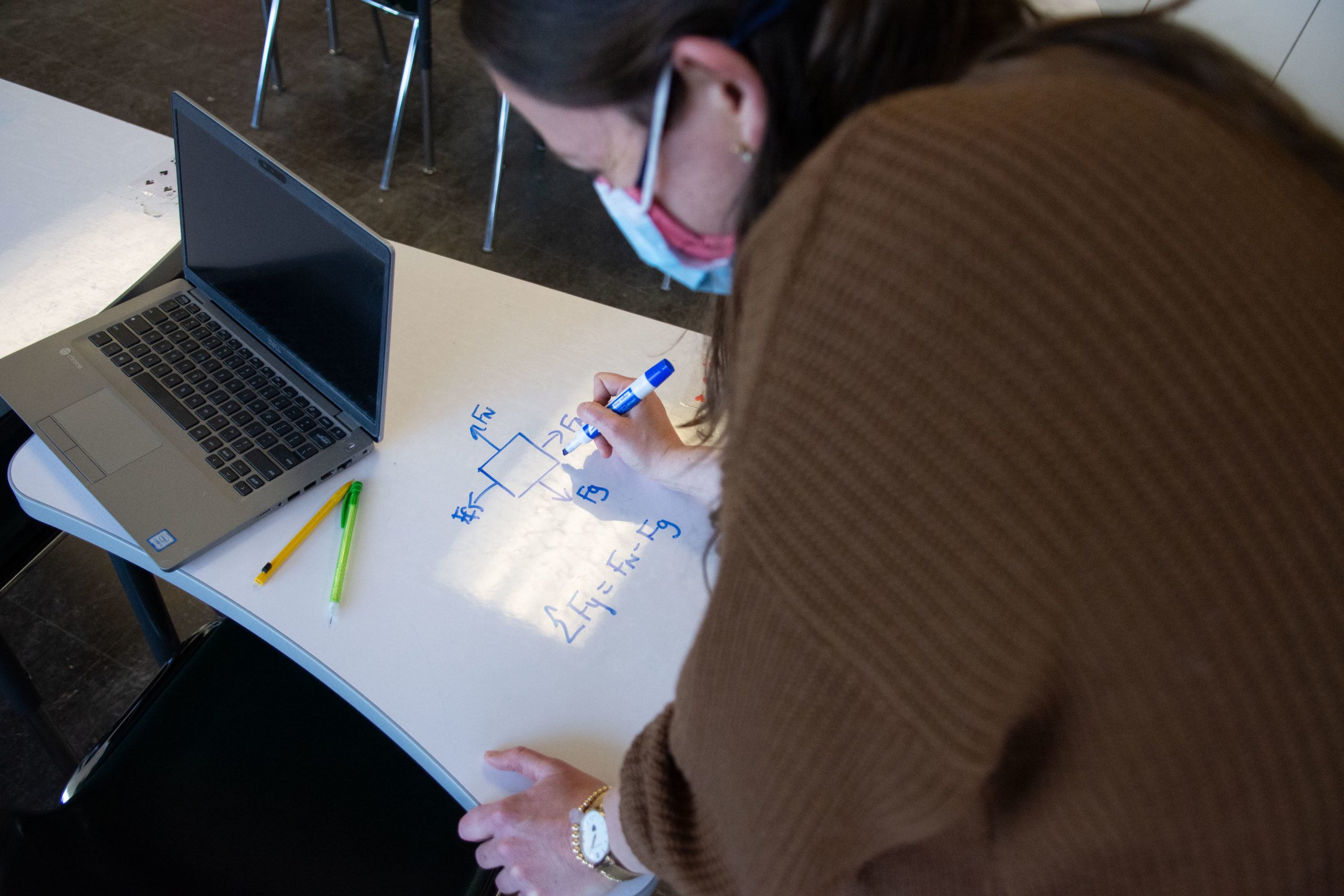December 16th, 2021
A passion for innovation and providing real-world learning opportunities in a gradeless classroom has made a Waterloo educator an award winner, and will likely take her to the Large Hadron Collider (LHC) at CERN in Europe.
Ashley McCarl Palmer, a physics teacher at Waterloo Collegiate Institute (WCI) has won the 2021 CAP Award for Excellence in Teaching High School/CEGEP Physics (Ontario). The award, presented by the Canadian Association of Physicists (CAP), recognizes excellence in teaching physics in Canadian high schools.

When she first heard the news, McCarl Palmer was elated to have been chosen and to now find her name amongst the great Canadian physics educators.
“To be included in their circle was a pretty high honour,” said McCarl Palmer. “I have a bit of imposter syndrome.”
As time went on though, McCarl Palmer began to see the power of the award, in supporting the innovative approach she takes to teaching physics to her students. An approach that, in the past, was not always met with cheers of encouragement.
“It kind of validated what I am doing,” said McCarl Palmer. “It just gave me the confidence to keep going.”
Beyond the recognition and support for her teaching methods, this award also presents a once-in-a-lifetime opportunity: the chance to attend the summer teaching institute at CERN, home to the Large Hadron Collider (LHC), in Europe.
“CERN is like number one on my bucket list,” said McCarl Palmer.
Winning this award puts her within shouting distance of this goal, as only one of the regional winners of the CAP award is chosen to attend on behalf of Canada. Doubling her chances, McCarl Palmer applied and was accepted separately to attend as a Canadian delegate. Due to the COVID-19 pandemic, this program has been put on hold, but she looks forward to attending in 2022.
“All I had ever dreamt of was going to CERN and now I have two avenues to get there,” said McCarl Palmer. “That’s the plan for summer 2022.”
She should be right at home at CERN, though, as McCarl Palmer’s classroom is just about as cutting-edge.
McCarl Palmer made three major shifts in her approach over the past five years, which were part of the reason why she was recognized by the CAP: She has gone gradeless in her approach to assessment, she has expanded her students’ physics toolkits and she has adopted “thinking classroom” strategies.

The move to a gradeless approach was because she found that “students were focusing on the marks, and not actually the learning or understanding what was going on in the classroom.” By taking the percentages and letter grades away, students are able to focus on what they did well, and where they made mistakes. The process of making corrections and identifying errors becomes a learning opportunity. It all contributes to creating an environment where students feel safe making mistakes – and learning from them.
Expanding her students’ toolkits for understanding physics involved moving beyond mathematics – just one of the tools to solve in physics. She connects problems to the real world and allows students to use words and visuals to hypothesize and demonstrate understanding. Ultimately, the aim is to provide a more complete understanding of what is happening, beyond the realm of math alone.
“I’m constantly trying to give them context and real-world connections,” said McCarl Palmer.
Creating a “thinking classroom” means an emphasis on collaborative learning, and group work. The focus is not just on students demonstrating their knowledge, but also how well ideas are communicated, and ideas tested. These skills prepare students for the workplace and for success in life beyond school.
“It’s all about collaborative problem solving, communicating ideas, grabbing tools from many places and relying on different backgrounds,” said McCarl Palmer. “I think that it’s more indicative of 21st-century learning and skills.”
Together, these factors create a classroom culture where students feel safe wrestling with a problem, leaning on their classmates for support and taking risks on their way to uncovering a better understanding of physics. It leads to situations where students are able to reach those moments of sudden realization – and deeper understanding. It’s what McCarl Palmer is all about.
“My favourite thing about teaching is the ‘lightbulb moments.’ I live for those moments.”
Categories: Husky News